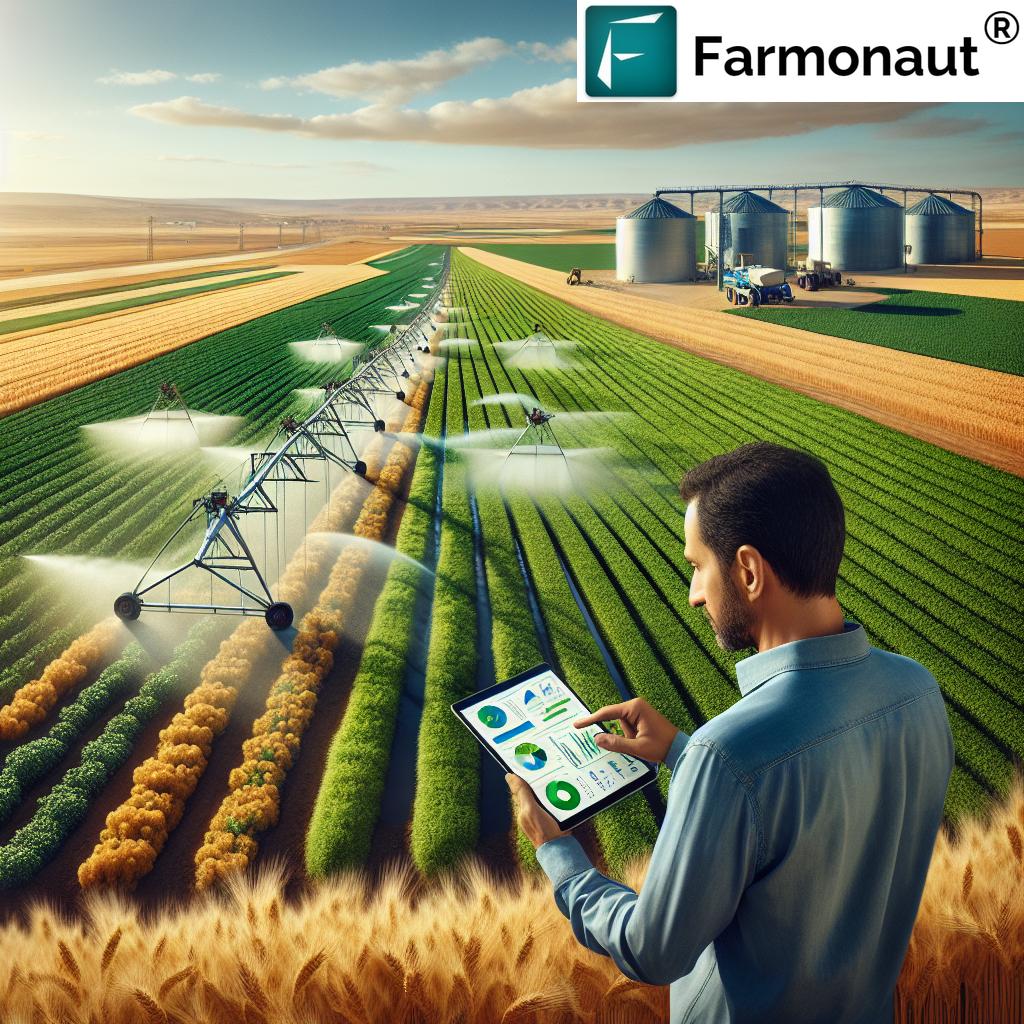Revolutionizing Agriculture: India-Nigeria Partnership Boosts Digital Transformation and Sustainable Farming Practices
“India-Nigeria agricultural partnership aims to impact over 200 million farmers across both countries.”
In a landmark move for agricultural cooperation between India and Nigeria, recent bilateral talks have paved the way for transformative agritech solutions in developing countries. We, as industry experts, are excited to delve into the details of this strategic partnership that focuses on sustainable agriculture practices, emphasizing renewable energy in agriculture and digital transformation in farming. This collaboration aims to enhance crop monitoring systems and precision farming techniques, fostering international agricultural partnerships that could reshape the future of agriculture in the Global South.
The Foundation of a Groundbreaking Partnership
On November 17, Indian Prime Minister Narendra Modi’s visit to Abuja marked a significant milestone in India-Nigeria relations. Meeting with Nigerian President Bola Ahmed Tinubu, the leaders engaged in extensive discussions aimed at enhancing collaboration across various sectors, including agriculture, defense, trade, and energy. This meeting underscored the commitment of both nations to address the challenges faced by the Global South and to leverage their strengths for mutual benefit.

The discussions were marked by a shared vision for combating security threats and fostering development. PM Modi’s offer to share India’s expertise in essential areas such as agriculture, transportation, affordable healthcare, renewable energy, and digital transformation was warmly received by President Tinubu, who recognized the potential for developing local capacities and skills.
Key Areas of Agricultural Cooperation
The India-Nigeria partnership in agriculture is set to revolutionize farming practices across both countries. Let’s explore the key areas where this cooperation is expected to make significant impacts:
- Digital Transformation in Farming: Leveraging India’s technological prowess to introduce advanced digital solutions in Nigerian agriculture.
- Sustainable Agriculture Practices: Sharing knowledge and techniques for environmentally friendly farming methods.
- Renewable Energy in Agriculture: Implementing clean energy solutions to power agricultural operations.
- Precision Farming Techniques: Introducing state-of-the-art methods for optimal resource utilization and crop management.
- Crop Monitoring Systems: Deploying advanced technologies for real-time crop health assessment and yield prediction.
This partnership is not just about technology transfer; it’s about building a sustainable future for agriculture in both nations. By focusing on these key areas, India and Nigeria are setting the stage for a agricultural revolution that could serve as a model for other developing countries.
The Role of Agritech in Transforming Agriculture
As global leaders in the agritech sector, companies like Farmonaut are poised to play a crucial role in this agricultural technology transfer. Farmonaut’s advanced satellite-based farm management solutions offer a perfect example of the kind of technology that could be instrumental in this partnership.
Farmonaut’s platform provides valuable services such as:
- Real-time crop health monitoring
- AI-based advisory systems
- Blockchain-based traceability
- Resource management tools
These technologies align perfectly with the goals of the India-Nigeria partnership, offering solutions that can significantly enhance agricultural productivity and sustainability.
Enhancing Agricultural Capacity Building
One of the key focuses of this partnership is agricultural capacity building and professional expertise exchange, particularly in West African nations. This aspect of the cooperation promises to have far-reaching effects on the agricultural landscape of the region.
“The bilateral agreement focuses on implementing sustainable practices in at least 50% of farmland by 2030.”
The agreement highlights the importance of:
- Local skill development
- Knowledge transfer in modern agricultural techniques
- Training programs for farmers and agricultural professionals
- Establishment of agricultural research and development centers
By focusing on these aspects, the partnership aims to create a skilled workforce capable of implementing and maintaining advanced agricultural technologies and practices.
Affordable Technology for Sustainable Farming
A critical component of this cooperation is the focus on making advanced agricultural technology affordable and accessible to farmers across both countries. This approach is crucial for ensuring that the benefits of digital transformation in farming reach even small-scale farmers.
Farmonaut’s API and API Developer Docs showcase how advanced technology can be made accessible to a wide range of users in the agricultural sector.

The partnership aims to introduce:
- Low-cost precision farming tools
- Affordable sensors and IoT devices for farm monitoring
- Mobile applications for agricultural advisory services
- Subsidized access to satellite-based crop monitoring systems
These initiatives are designed to make cutting-edge agricultural technology accessible to farmers of all scales, thereby democratizing access to precision agriculture.
Comparative Analysis of India-Nigeria Agricultural Partnership Benefits
| Area of Cooperation | Benefits for India | Benefits for Nigeria |
|---|---|---|
| Digital Transformation |
• Expansion of agritech market • Testing ground for new technologies |
• Access to advanced agritech solutions • Improved data-driven decision making |
| Sustainable Farming Practices |
• Sharing of eco-friendly techniques • Enhanced global reputation in sustainability |
• Increased crop yields • Reduced environmental impact |
| Crop Monitoring Systems |
• Validation of monitoring technologies • Development of region-specific solutions |
• Improved crop health management • Early detection of crop diseases |
| Precision Farming Techniques |
• Export of precision farming equipment • Research opportunities in tropical agriculture |
• Optimal resource utilization • Increased farm productivity |
| Renewable Energy in Agriculture |
• Market for solar-powered agricultural tools • Advancement in off-grid farming solutions |
• Reduced dependency on fossil fuels • Lower operational costs for farmers |
| Skill Development |
• Opportunities for Indian agricultural experts • Cross-cultural knowledge exchange |
• Enhanced local agricultural expertise • Creation of skilled agricultural workforce |
Impact on Food Security and Economic Growth
The India-Nigeria agricultural partnership has the potential to significantly impact food security and economic growth in both countries. By implementing advanced agricultural practices and technologies, we anticipate:
- Increased crop yields and agricultural productivity
- Enhanced food security through improved crop management
- Creation of new job opportunities in the agritech sector
- Boost in agricultural exports and economic growth
This collaboration could serve as a model for South-South cooperation, demonstrating how developing countries can leverage each other’s strengths to address common challenges.
Sustainable Development in the Global South
The partnership between India and Nigeria extends beyond bilateral benefits, potentially setting a precedent for sustainable development in the Global South. By focusing on sustainable agriculture practices and renewable energy in agriculture, this collaboration addresses critical global challenges:
- Climate change mitigation in the agricultural sector
- Sustainable use of natural resources
- Reduction of carbon footprint in farming activities
- Promotion of biodiversity and ecosystem health
These efforts align with global sustainability goals and demonstrate how international agricultural partnerships can contribute to broader sustainable development objectives.
The Role of Technology in Transforming Agriculture
At the heart of this partnership is the recognition of technology’s transformative power in agriculture. Advanced technologies like those offered by Farmonaut are set to play a pivotal role:
- Satellite-Based Crop Monitoring: Enabling real-time assessment of crop health and growth patterns.
- AI and Machine Learning: Providing predictive analytics for crop yields and pest management.
- Blockchain Technology: Ensuring transparency and traceability in agricultural supply chains.
- IoT Devices: Facilitating precision agriculture through sensor-based data collection.
These technologies are not just about increasing productivity; they’re about creating a more resilient and sustainable agricultural ecosystem.
Challenges and Opportunities
While the India-Nigeria agricultural partnership presents immense opportunities, it also comes with its share of challenges:
- Infrastructure Gaps: Addressing the need for robust digital infrastructure in rural areas.
- Skill Development: Bridging the knowledge gap in advanced agricultural technologies.
- Cultural Adaptation: Tailoring solutions to local farming practices and cultural contexts.
- Financial Constraints: Ensuring accessibility of technologies to small-scale farmers.
However, these challenges also present opportunities for innovation and localized solutions, driving further growth and development in the agricultural sector.
Future Prospects and Global Implications
The India-Nigeria agricultural partnership sets a precedent for international cooperation in agricultural development. Its success could pave the way for similar partnerships across the Global South, leading to:
- Increased South-South technology transfer and knowledge sharing
- Development of region-specific agricultural solutions
- Enhanced global food security through improved agricultural practices
- Creation of a more resilient and sustainable global agricultural ecosystem
As we look to the future, the potential ripple effects of this partnership on global agriculture and sustainable development are immense.
Conclusion
The India-Nigeria partnership in agriculture represents a significant step towards revolutionizing farming practices and achieving sustainable development goals. By leveraging advanced technologies, fostering knowledge exchange, and focusing on capacity building, this collaboration has the potential to transform agriculture not just in these two countries, but across the Global South.
As we move forward, the role of innovative agritech solutions, like those offered by Farmonaut, will be crucial in realizing the full potential of this partnership. The journey towards a more sustainable and productive agricultural future has begun, and we are excited to see how it unfolds.
FAQ Section
Q: What are the main focus areas of the India-Nigeria agricultural partnership?
A: The main focus areas include digital transformation in farming, sustainable agriculture practices, renewable energy in agriculture, precision farming techniques, and crop monitoring systems.
Q: How will this partnership benefit farmers in both countries?
A: Farmers will benefit from access to advanced agritech solutions, improved crop yields, sustainable farming practices, and enhanced knowledge through skill development programs.
Q: What role does technology play in this agricultural cooperation?
A: Technology plays a crucial role, including satellite-based crop monitoring, AI-driven advisory systems, blockchain for traceability, and IoT devices for precision agriculture.
Q: How does this partnership address sustainable development goals?
A: The partnership focuses on sustainable agriculture practices, renewable energy use, and efficient resource management, aligning with global sustainability goals.
Q: What are the potential challenges in implementing this partnership?
A: Challenges include addressing infrastructure gaps, bridging skill gaps, adapting technologies to local contexts, and ensuring financial accessibility for small-scale farmers.
















